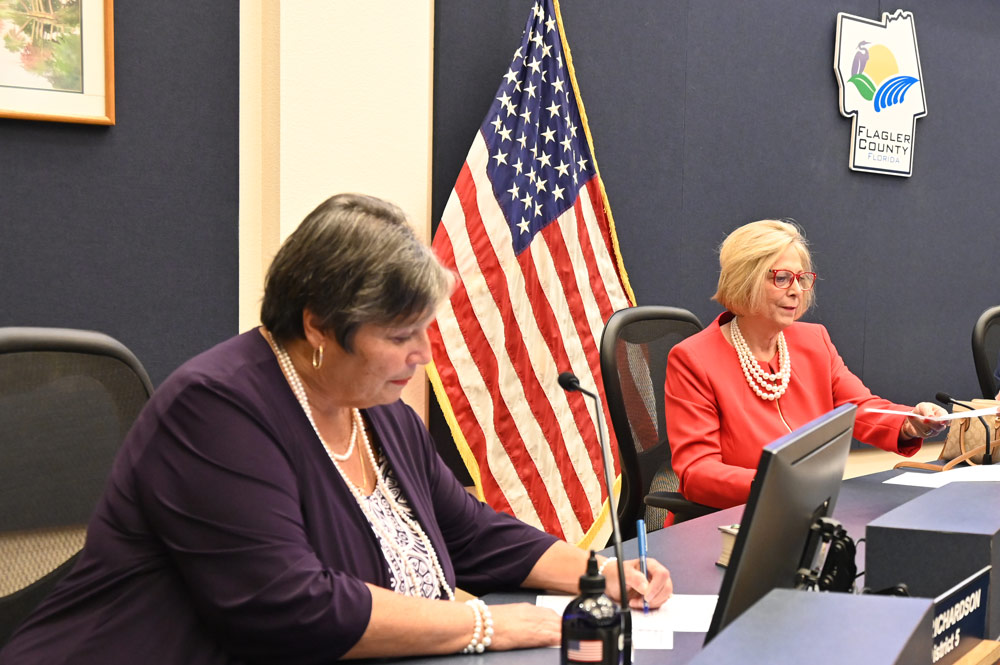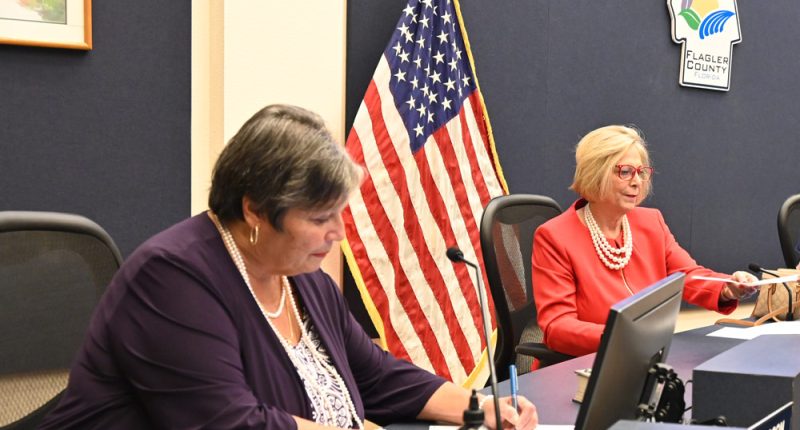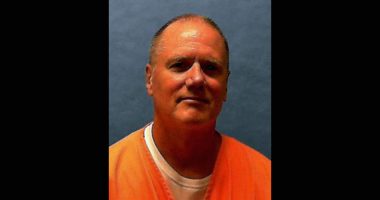
All Flagler County Administrator Heidi Petito was asking for was whether county commissioners agreed with a particular way of splitting revenue with Palm Coast and Bunnell from a proposed sales tax increase to pay for beach management.
Instead, and just as cities had been increasingly coaxed to support the county, Petito heard a majority of commissioners–Leann Pennington, Kim Carney and Pam Richardson–speak in opposition to a sales tax increase. Without that increase, the plan Petito devised to rebuild and manage all 18 miles of the county’s beaches would collapse, and with it any hope of continuing the beach renourishment the U.S. Army Corps of Engineers started in Flagler Beach–or on many additional miles the county planned to rebuild.
The proposed half-penny sales tax increase requires a supermajority of at least four commissioners to pass. Pennington’s opposition was known. Carney and Richardson had spoken in favor of Petito’s plan as they joined Commission Chair Andy Dance and Commissioner Greg Hansen in endorsing it in early March. Two weeks later Carney began to waver.
On Monday, Carney spoke against the plan, citing its timing while relying on some inaccurate information. Richardson echoed Carney, making it a majority of three opposed to the sales tax plan, if they stick with their new position. They did not speak as if they were hesitant.
The commissioners’ retreats took Commission Chair Andy Dance by surprise and prompted him to call for a vote soon on the tax plan. “We’re going to have to vote on this,” Dace said in an unusually terse tone. “We can’t have staff continuing to do this. This is not helpful at all. And we’re going to have to put the beach renourishment on the agenda and continue to either do it or not, and I would push for some time probably in May.”
For Carney, it was stunning betrayal of Flagler Beach, her hometown where she’d been a city commissioner for nine years, and where the city commission has declared itself “all in” for the county plan.
“I think we’re all reading our legislative updates,” Carney said. “So this board is going to get the direction from our governor that he wants to lower the sales tax by 0.75, but yet this board is going to say, well, thanks governor, but we’re going to raise it a half a cent. I think we need to look at the atmosphere that we’re in right now. And I’ll go out there and say that what looked as something to be an answer is not looking like an answer on April 7, 2025.”
Carney’s information was somewhat inaccurate. She was referring to a proposal by House Speaker Daniel Perez to cut the sales tax from 6 to 5.25 percent, costing the state $5 billion in lost revenue, and local governments a loss of $540 million a year. Perez says the loss can be made up through savings from unspecified state agency spending.
Gov. Ron DeSantis last week said Floridians were not clamoring for a sales tax decrease, and spoke against the Perez proposal. He favors sending every homesteaded homeowner a one-time $1,000 check, though the homesteaded already benefit from steep tax benefits thanks to the Save Our Homes cap on property tax increases.
The House Ways and Means Committee unanimously approved the Perez proposal on April 2. But the bill has no companion in the Senate, where Senate President Ben Albritton is opposed to both Perez and DeSantis proposals, calling them both hasty and lacking study. So Carney ad Richardson may themselves be hinging local policy on speculative tax cuts that appear unlikely to happen.
Carney said there are other options than the sales tax. “I haven’t found them yet. I’m working on them,” Carney said, “but I’m not convinced that this county is going to look strong and unified if we put a half cent as governor DeSantis brings us down. And I’m not saying that’s going to pass. I’m not saying that. But we’re not thinking the same way as our governor is thinking.”
Carney also inaccurately referred to Palm Coast “annexing at the rate that it has.” Palm Coast annexations for over a decade and a half have been limited to targeted parcels. Its westward expansion is planned on land it annexed years ago. The largest planned annexation, currently on hold, is by Flagler Beach.
Richardson claimed the beach-management plans have changed several times, going “in a full circle all the way around to make me a little uncomfortable about all of it.” (As Dance told her, there have only been two plans: one to manage the unincorporated portion of the beach, and the current plan, which absorbed the previous one.) Richardson sees discord between residents on the barrier island or between people on the barrier island and the mainland (though there has been no evidence of that discord in public meetings).
“We have to make a fair assessment for everyone. And I don’t know what that is at this point,” Richardson said. “But as per Commissioner Carney, the governor is Doging, and we need to start Doging too.” Richardson was turning the acronym for the Department of Government Efficiency, or DOGE, into a verb. The department, informally led by Trump adviser Elon Musk, has been slashing through the federal budget, drawing much fire and ire.
“When we start talking about adding taxes, when everybody else is gunning them, I’m very concerned about that. That’s major,” Richardson said.
Dance tried to correct some of the commissioners’ misconceptions. Flagler County’s tax plan, he said, “has to be separate from the musings that are going on in Tallahassee. And I’d say the Doge thing is one thing. Doge is efficiency. What you’re talking about is investment in the beach infrastructure. I’m all for the digging down and looking for efficiencies within us.”
Pennington still opposes a sales tax increase. She said beach management can be achieved in “drips and drabs” by managing certain unincorporated parts of the beach, as one previous county plan had it. Pennington also tied revenue from the Environmentally Sensitive Lands fund to beach management. ESL revenue is drawn from a modest levy on the property tax and approved by referendum. Using that revenue for beach management has not been considered before.
“Current ESL is a non-starter for what we’re doing,” Dance said. “You can’t use current ESL.” Pennington is suggesting that when the referendum is again before voters, beach management could be substituted for its potential uses “if the beach is such a priority.”
The Petito plan calls for a new half-cent sales tax, with half the revenue from Palm Coast’s and Bunnell’s share going to beach management, and the full share from Flagler Beach and Beverly Beach going to beach management.
The discussion had started when Petito updated the commission on her talks on the sales tax with the administrations in Palm Coast and Bunnell. Both cities’ elected officials had been hesitant about it before warming to the idea. Though the approach has not been approved by their city governments yet, the two administrations are working on an option that would limit the amount of money each city would contribute to the beach.
The cities would pay a baseline share that would remain steady year after year. In other words, if Palm Coast’s 50-50 share were to be $2.7 million next year, then Palm Coast would keep paying that same amount, year after year, even though revenue is expected to increase. That way, the city could see its portion increase over the years.
All Petito was looking for was agreement from the County Commission to head that way. She never got it as the discussion went in many different directions.
“Staff has to know what they’re working with, and right now, they’re under the guidance of our consensus from a month, a month and a half ago, working with the municipalities,” Dance said. “So they can’t continue on this path if it’s going to be fruitless, they need to know.”
![]()









